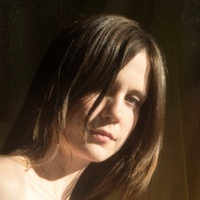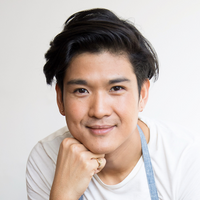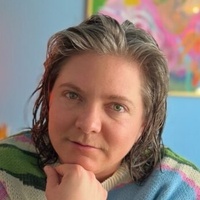As told to Jancie Creaney, 2427 words.
Tags: Music, Mental health, Process, Beginnings.
On putting a pin in self-doubt
Musician Marina Allen on accepting where you’re at, working to have the proof behind you, and the life revealed on the creative path.You were born in New Jersey and your family moved to California when you were a kid, and then you came back to the East Coast for school when you were around 18. I wondered what you studied, if you studied music, and what else you were up to back then?
I went to this really small liberal arts school called Bennington College in Vermont. Donna Tartt kind of put it on the map. I mean, it’s a known school, but it’s very small. The school had 800 people in undergrad, but she wrote this book called The Secret History, and it’s loosely based off of Bennington.
It’s sort of an interdisciplinary art school. I studied music, but I studied a lot of different things. I studied philosophy for a while, and then I got into painting my junior year. Later on, I got really into vocal music and Pauline Oliveros and Meredith Monk and graphic notation.
It gave me so many resources that I would not have been able to tap into. It kind of really did teach me how to connect the dots—how to want to be an artist, how to be an artist—because it just forces you to do it. It was a really amazing school. I feel very lucky that I went there. It’s such a weird place and a lot of people drop out, and I dropped out for a little, and then I came back to it. It’s pretty intense but it was foundational in how I think about art.
Then you went back to California?
And then I moved back to California and I was just living at home, and that was when I first decided to record some music. I mean, I had recorded music prior to that in high school and a little in college, but when I moved back home, I was also living with my stepmom, who’s a writer, and she has a full career around her art. She was a very inspiring voice in my head to help me muster up the courage to get things together. So that’s where I wrote my first little EP, which I called Rabbit Rabbit, and it was on Bandcamp, which it no longer is. Maybe one day I’ll put it back on.
It was once I started writing the album in a serious way that I feel like my path sort of unraveled. There were all of a sudden steps I could see that I knew I needed to take. The goals all of a sudden appeared.
In an interview that you did with Folk Radio UK, you mentioned something your stepmom said, which is, “the willingness comes from the pain.” You were talking in reference to Candlepower; what it took to make that album, the long journey that brought you to that point. How do you think about that idea now? If the first album was born out of this willingness that pain pushed through, what then do you think was the driving force in making the second?
It’s this constant challenge to confront the voice in your head that wants you to stay hidden, at least for me. Candlepower was forged in this fury of me just being so sick of it. I was sick of feeling the way I was feeling and knew I was an artist, and I needed to make this thing happen. With Centrifics, and the music that I’m making now, it’s not as potent, necessarily, that feeling. There’s been a lot of healing around it. But it’s still that feeling of, when I play a show or when I write a song and share it with someone, it still has that really shitty feeling of like waking up the next morning after you drank or something. I’m not a huge drinker, but that feeling where you are so embarrassed and you’re like, “Wait, was that so embarrassing? Did I say something insanely rude?” You just sort of spiral out.
That still comes up. I think I’m going to have that feeling for the rest of my life. It’s an impulse reaction to the voice trying to quiet me and make me small again, because that’s a comfort zone. The only antidote to it is to keep challenging it and kind of prove it wrong and keep showing up for yourself, even if it’s really uncomfortable. I think you just get better at dealing with how uncomfortable it is. I don’t think it actually gets comfortable. I read this thing once about grief, and it kind of relates to it: it’s not that the grief gets smaller, it’s that your ability, the container to hold it, gets bigger. Those feelings don’t go away. You just have tools now to not listen to them.
You’ve said that it was when you were in your late teens, early 20s, that you started more intentionally making music, developing a musical voice, and really finishing songs. Speaking with The Underground of Happiness, you said, “It took me a while to have the courage to believe that I deserve to be doing that.” Finding that courage to believe creates a massive shift, even if, like you said, the little voice is always there. What do you remember of the time when you found yourself able to move toward music with stronger resolve?
It was such a radical moment for me. I think of my life as totally different than what it was before then. I think you need a rock bottom. I mean, maybe you don’t, but I did. I was in a really bad relationship, and I that is what propelled me to make the music. The music itself was the ladder to help me build a bridge basically out of whatever I was in. I hold that process so close to my heart because it was how I was able to come into myself. It was really hard, but it was baby steps. I just made a pact with myself that all of this self-doubt, I could just put a pin in it.
I tried so many different things and I was exhausted by myself. So, it was this pact that I made, that every day I would work towards it. And, in that, you’re able to show yourself you can do it. It’s like, “Okay, that wasn’t hard. I did this.” And then, “That wasn’t that hard, I did this, and I contacted this person, and I set up this session, and I talked to this other person.” Just going through the motions with this “fake it till you make it” attitude. That was actually really helpful. When you struggle with self-worth, you can know that it exists, but you can’t engage with it, or nothing’s going to come out of it.
I remember in that same interview, you said, the writing or the music creates the path that you don’t know exactly. The music is showing you the way.
Yeah, totally. I mean, in a creative path, it’s just highlighted more, because you don’t have the illusion of a real career and you don’t have a guided path there. There aren’t these pillars that you can reach that make you feel like you’re on a path. That’s what’s so hard about it. But also what’s so beautiful is that the chaos is sort of revealed, or the mystery of creating a life is revealed more, I think, through a creative path.
I’m sure other people could disagree with that, but you’re kind of forging your own way, and the music, whatever’s coming out, brings different experiences and you get involved with different people based on what you’re showing up with. There’s the next lily pad, and then the next lily pad, and you’re just kind of hopping along, and you don’t really know where the next one is going. I’m really grateful to live this way because the trusting of the next step, basically, becomes your anchor to your life. That’s kind of all that you can have with a creative path.
I love the lily pad idea so much. All you need is a little spike in courage and you jump to the next lily pad.
And that’s kind of what making something is. It’s these little spikes of courage where it’s like, “Okay, I’m going to finish the song today.” And then you do it, and the next day you listen back and you’re like, “Okay, that works.” And then that’s enough to get you to the next place. That’s why finishing things and really honoring it is needed and showing yourself that you can do it. I don’t know how you would be able to keep doing it if you didn’t have the proof behind you.
How do you navigate writing a song?
It’s a lot of listening, it’s a lot of trusting, it’s a lot of non-judgment. My favorite songs I’ve written are very spontaneous and surprising. That’s what happens in truth. When you’re in truth, it’s different than you think it’s going to be, and it leads you to different feelings. And channeling that is what I aim to do. It’s not always like that, but I do a lot of work to try to get myself to say what I’m really saying, and to be honest with myself in writing.
I’m curious to know about the relationship for you between writing and music; what that relationship is like, if writing came first for you, or if it was always attached to music or singing?
Both my parents are writers and I grew up with an annoyingly literate family. I was always very intimidated by writers and intellectualism in general. I love to write, and it was definitely a calling, but I didn’t feel like I was good enough to just be a writer. Meanwhile, I’ve been singing choir since I was a baby, and music has always been a friend to me that way. I didn’t have to prove myself with it. It was a given already.
So, for me, it was a happy marriage where, with lyrics, there’s a lot more leeway with what is good ultimately. You don’t have to be this highbrow academic intellectual to be a great lyricist. A lot of the lyrics that I love the most are these kind of raw, punk poems almost. I could cobble together a way of seeing things rather than feel this constant need to prove that I was smart and prove that I could compete with other smart people. When I started writing my own music, I think it was in reaction and in a way kind of this small anarchist plea with myself to be able to do whatever I wanted to do outside of the confines of what I thought art and literature was.
I feel like, sometimes, something written down on paper can sound so dumb, but in a song, where you can perform it, you can alter its sound, you can put the emphasis where you want, you can sing it in a way that makes it sound sarcastic even. It’s something I’ve thought about a lot.
I think, for me at least, it’s an easier way to inhabit a lot of dynamic feelings or a lot of conflicting feelings, whereas, that obviously can be achieved beautifully in writing, but it’s a lot harder, honestly. I think an amazing complex poem that’s pulling at so many different fringes of being and just contains so much, it’s a lot of work to get there. With music, there’s something more intuitive to it. Especially how I write, that’s where I feel free and I don’t have a self-critic. It’s like, “Okay, what do I want to hear? What do I need to hear right now?” A lot of times that’s how I’ll write a song or think about an album. “What is this void and how do I fill it? What is this lack of feeling and how do I create it?”
I heard this once too and it really hit me: If you want hope, you have to create hope. If you want light, you have to create light. If you want beauty, you have to create beauty. I think it’s less about trying to find it and more like you actually have to make it. I feel really inspired by that, because in some ways, it’s a lot easier to make it yourself than to go out and try to find it. I think it goes back to what I was saying about trusting yourself. Ultimately, the songwriters I love the most are the people who are really looking at themselves and trusting that what they’re saying is okay.</span> Even if they’re talking about terrible things they’ve done, the fact that they’re sharing it for you, they’re including you, like how a best friend would call you up. There’s such a sacredness when your friend is calling you on the phone to tell you something really scary or a secret, there’s like that feeling of a pin drop, the presence of truth. I think that can happen a lot in writing, and it’s hard to get to, but it can be really healing and really radical.
I love that, the presence of truth. You said earlier, “when you are in truth” and I guess I’ve never thought about that movement of being in truth, but of course it sounds so right. You have to get to that place.
In that place there’s relief, a lot of times there’s grief, there’s a surrender that happens, and it really helps with songwriting for me because the worst times, when I’m writing, is when I’m trying to control where the song’s going because I’m insecure about sharing my own limitations. When you accept yourself and accept where you’re at, all of a sudden the song feels free to move around and say what’s really been on your mind; you sing the song that’s really in your heart then, not the one that you want or wish was in your heart.
Marina Allen Recommends:
The Mini Time Machine of Miniatures Museum in Tucson, AZ
Chong Quing Special Noodles in Alhambra, CA
Nourishing Traditions by Sally Fallon (cookbook)
Self-Realization Fellowship in Mt. Washington, Los Angeles
This Jungian Life (podcast)




